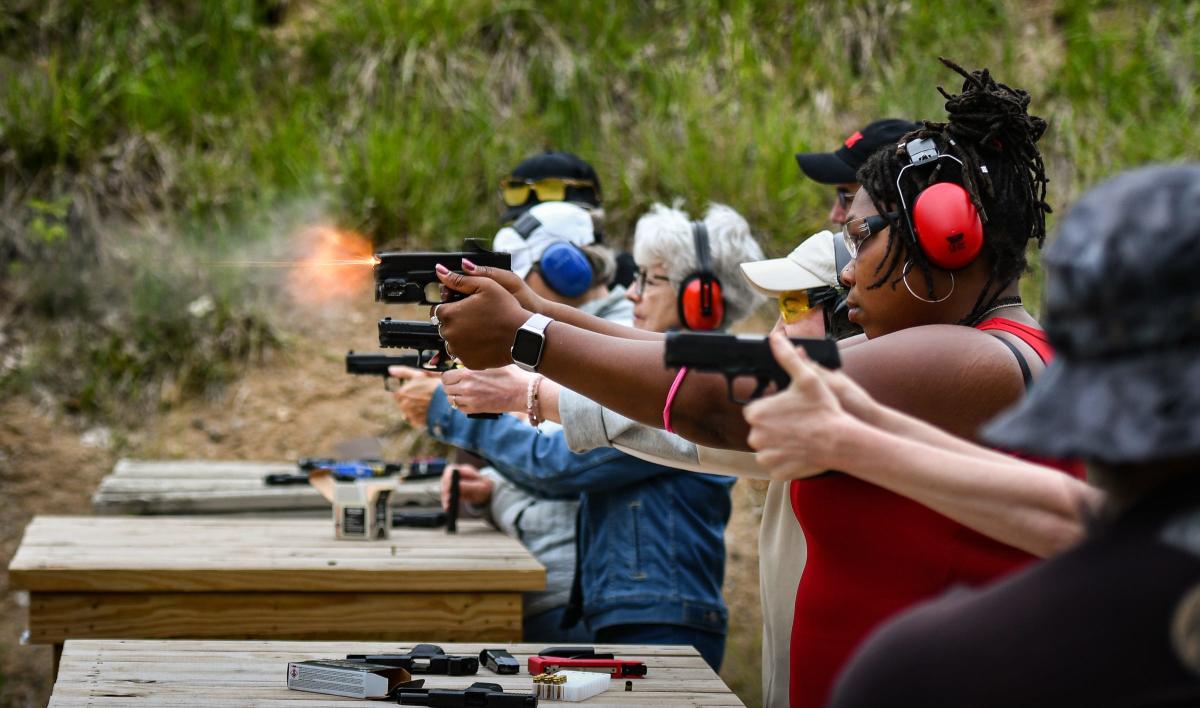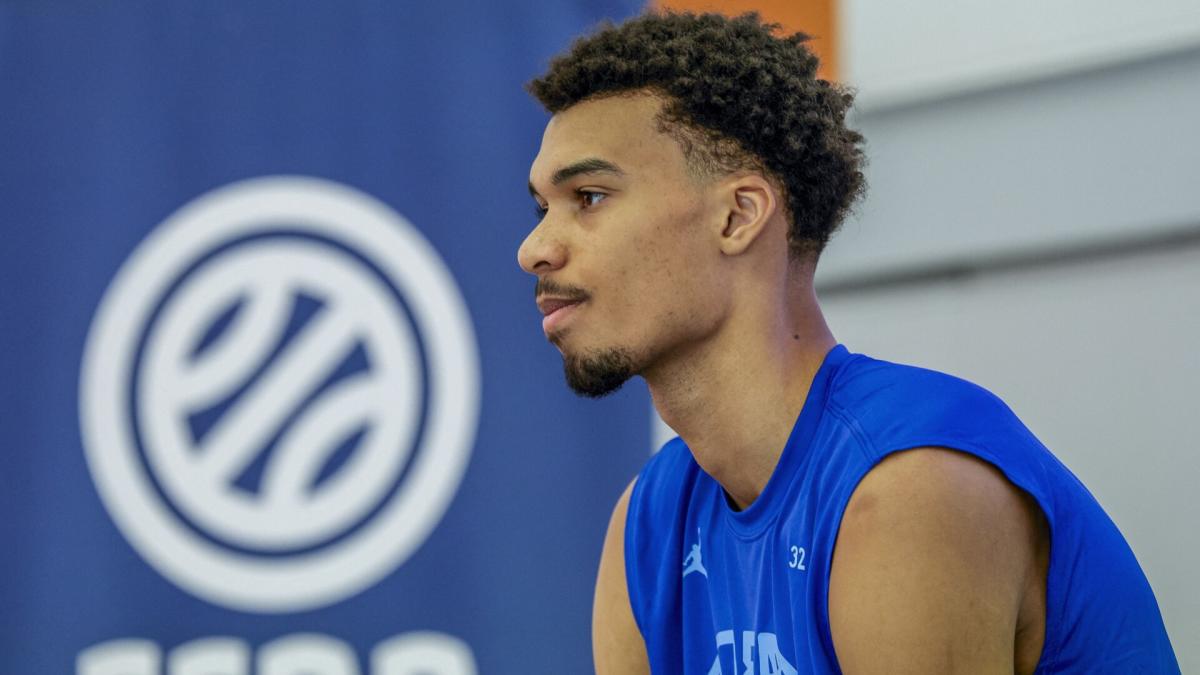LANSING — There are significantly more people who want to carry concealed handguns in Michigan today than a decade ago.
The demographics of who is buying firearms, including handguns, started to shift during the pandemic and helped drive dramatic increases in applications for carry permits. However, it remains to be seen whether these new gun owners with concealed pistol licenses — more likely than ever before to be liberal-leaning residents in urban areas — will significantly alter where people with a CPL live in Michigan, at least on a per capita basis.
Statewide, there were 843,257 CPL holders as of July 1, equal to about 11% of the state population old enough to apply.
And even with the swell of new handgun owners in metropolitan areas like Lansing, Detroit and Flint, there still are stark differences.
For example, in Alcona County, in northern Michigan along Lake Huron, about 19% of adults over age 20 have a concealed pistol license, the highest rate in the state, according to a State Journal analysis of Michigan State Police data. Washtenaw County, 200 miles south and home to the University of Michigan, has the fewest CPLs, with about 6.6% of adults licensed to carry.
The data confirms long-held assumptions and trends about firearm ownership being more common among white people who live in rural, politically conservative areas. But early in the pandemic, during one of two application spikes in the past decade, that started to change.
And LaMaris Rodgers could see it early on.
Rodgers, 36, is a Waverly High School graduate and a firearm trainer. He said he could see the interest in firearms and CPLs skyrocketing during the pandemic’s first year, including a large increase in Black gunowners and those who lived in cities. Shutdowns had people panicked and, he said, clients told him they’d called police and had no one respond.
“People wanted to learn to be their own first responder,” he said.
Concealed pistol applications peaked in 2021
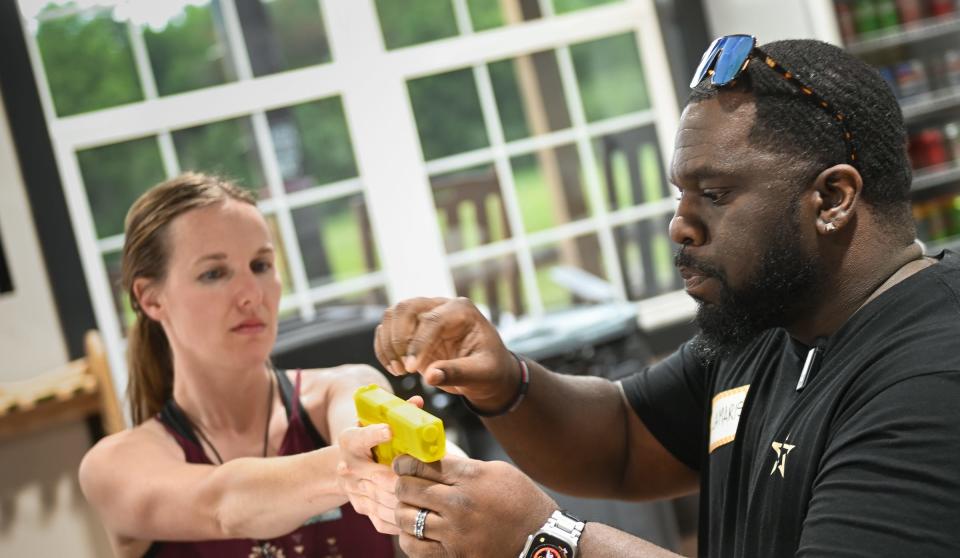
In 2021, the tally of granted concealed pistol licenses, which allow their holders to carry a concealed handgun in Michigan, had reached a new high. The previous record for CPLs issued in a single year was 170,961 in 2017, the first data released after Donald Trump was elected president.
Rates dropped the next year, staying under 140,000 issued CPLs for the next three years before starting another upward climb in 2020, according to a State Journal analysis.
In 2021, Michigan issued more than 232,000 carry licenses — a 36% increase over the previous record set just five years earlier.
“I think the obvious point is that gun ownership has really shifted, and this is a shift well beyond Michigan,” said Jennifer Carlson, an Arizona State University professor who in 2010 conducted research in Michigan about the CPL process.
Carlson added that no longer are hunting and sport shooting the main impetus for new gun owners. It’s self defense.
“Guns can express many things,” she said. “They can express a fear of crime. They can express a connection with a community. … Guns are really embedded in the self defense culture.”
And while a decade of CPL data can provide some insights into firearms in Michigan, experts said the issue is complex, which is why it’s difficult to make conclusive statements without further research and data — even as it relates to changes in why someone loses a CPL.
“We don’t necessarily have good measures of gun ownership in general,” said Alex McCourt, an expert at the Center for Gun Violence Solutions at Johns Hopkins University. “That’s one of the shortcomings of gun research.”
CPLs still more popular in rural Michigan
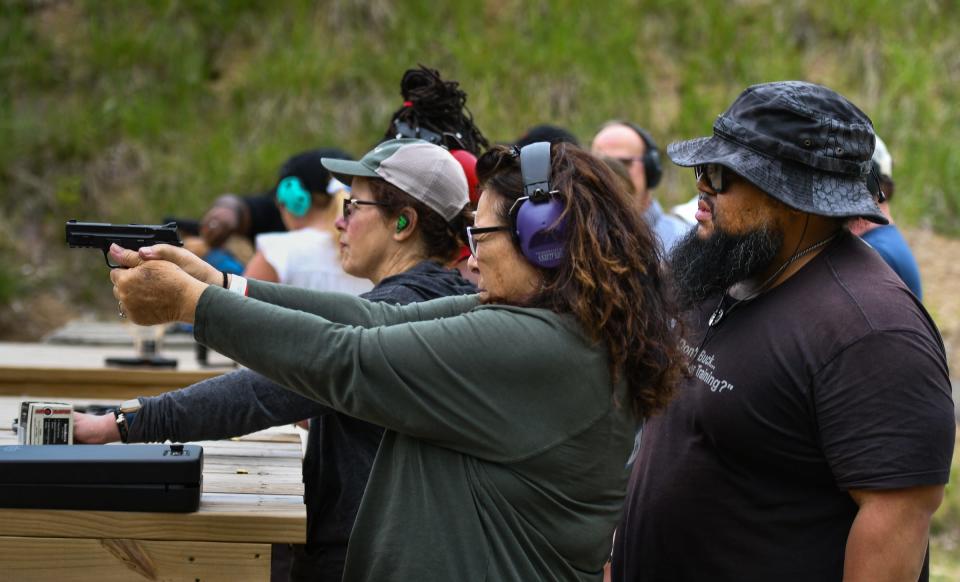

While more adults in cities are buying guns and getting CPLs, Michigan’s smaller, rural counties farther north still have more licenses when adjusted for their populations.
The State Journal analyzed a decade of CPL data from Michigan State Police as well as U.S. Census Bureau population data. To examine the popularity of CPLs across Michigan’s 83 counties, the LSJ compared the number of CPLs to Census Bureau estimates for county residents 20 years and older. While Michigan requires people who want to buy a handgun, or obtain a CPL, to be at least 21 years old, 20-year-old residents are included in population counts due to limits in the way the U.S. Census Bureau groups ages in its estimates.
Statewide, there are 109.9 CPLs for every 1,000 residents 20 and older, or about 11%, according the State Journal analysis.
Only 17 counties have lower rates; 12 counties have fewer than 100 CPLs per 1,000 adults, including Ingham, Oakland, Kent, Kalamazoo and Washtenaw.
By contrast, there are 18 counties with per capita CPL rates of 150 or higher, including Barry (153), Dickinson (154.6), Lapeer (164.3), Montmorency (182.8) and Alcona, which has the highest rate in Michigan at 192.
Washtenaw County, home to Ann Arbor, has the lowest per capita rate at 66.3.
Ingham County’s 75.1 licenses per capita is 81st out of 83 counties. Eaton County’s 132.5 per capita and Clinton County’s 128.9 put them at 40th and 45th, respectively, in Michigan.
The 10 most populous Michigan counties have, on average, 483,324 residents 20 and older and 98.9 CPLs per capita.
For the 10 smallest counties, the average population is 6,438, and the average CPL rate is 158.
However, some of these trends could slowly be changing as both researchers and local gun owners have seen increased interest in firearms and CPLs.
Self defense a reason many buy their first gun
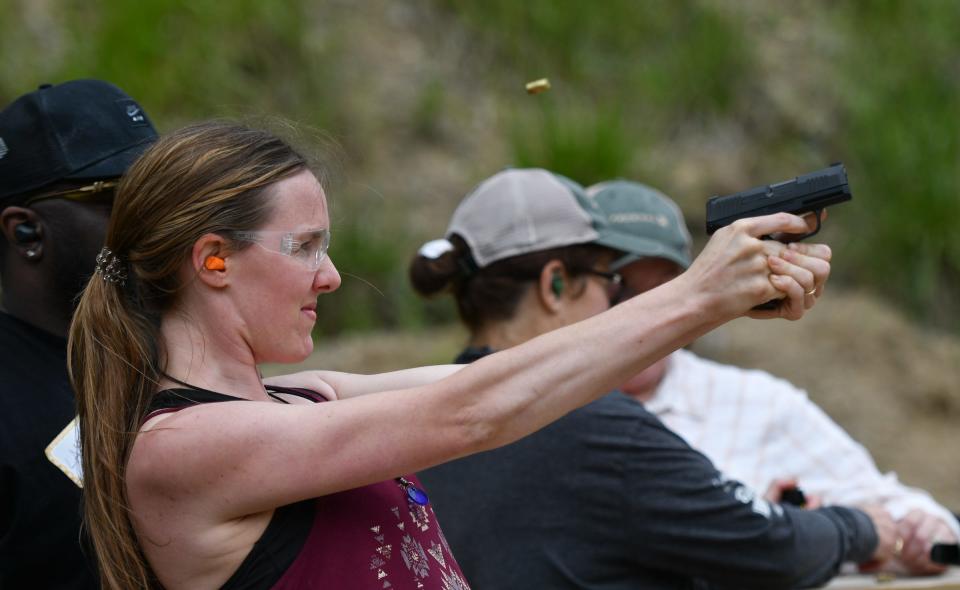

Rodgers bought his first gun in 2013, when he was in his mid-20s.
Years before, he said, he was stabbed in the back, near his spine, when someone stole a car. He called it a life-threatening and life-changing event.
Rodgers grew up in a Lansing home without firearms and his parents didn’t like them around, but like many kids he played with toy guns. It wasn’t until he became a victim that he felt he needed one of his own.
At first there was a bit of culture shock, Rodgers said. He’s Black and in 2013, far more than today, gun ownership in Michigan and the United States was more common in white, rural and conservative circles.
“There was a nerve-wrecking feeling of ‘I am so out of place in these gun stores,'” he said, adding that he soon became more comfortable after he started talking about firearms and shooting. There was common ground not only in an interest, but in respect for firearms that helped bridge the gap, he said.
Rodgers, it turns out, was ahead of the curve.
Among the takeaways from the surge in firearm ownership that started early in the pandemic was that a major driver of purchases were Black, liberal-leaning, first-time gun owners from urban areas, researchers found.
Rodgers, who teaches firearm training classes in Lansing, said the number of Black women who have a handgun gun and CPL might surprise people. He and a business partner have held firearm training classes specifically for domestic violence victims. The state requires CPL applicants to take a handgun training class.
“We have people who have trauma, who have dealt with trauma,” Rodgers said. “There’s that terrifying fear (of the gun) at first.”
What the data can and can’t tell us about guns in Michigan
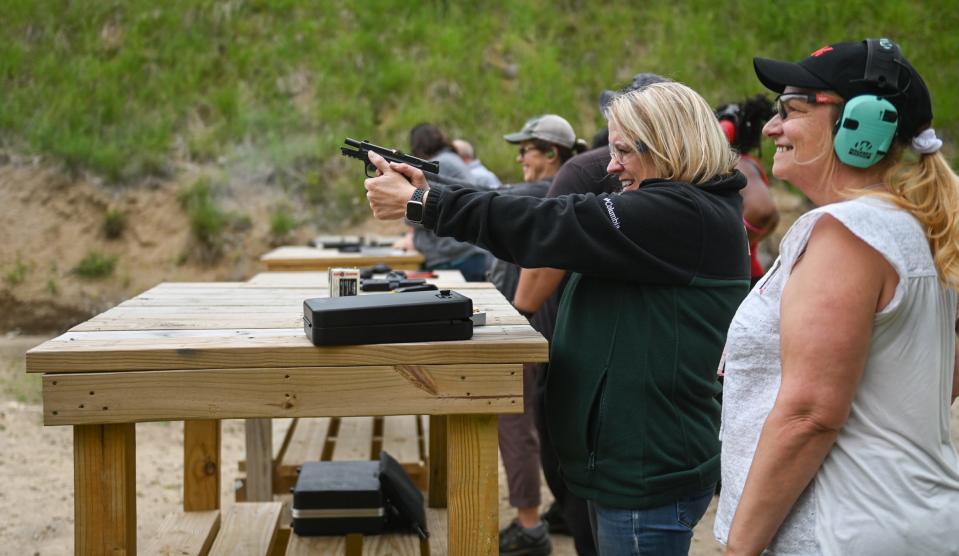

Michigan wasn’t the only state to see increased interest and purchases by first-time gun owners early in the pandemic.
National sales in 2020 quickly outpaced the previous year by an estimated 85.3% in some measures. Additional research estimated that about 42% of people who bought a firearm that year bought their first gun.
McCourt, the Johns Hopkins expert, said that research, coupled with Michigan’s jump in CPL applications, “suggests an increase” in firearms in the state, but cautioned that the analysis is not a straight line.
Not every new CPL application represents a new gun owner or a new handgun purchase. The data also includes application renewals. CPLs have to be renewed every five years. Pending applications also reached new highs.
However, McCourt said the data on Michigan CPLs is still useful in understanding gun ownership trends in Michigan and beyond.
Carlson, the ASU researcher, spent time in Michigan in 2010 to research the state’s system at the time, when county gun boards made decisions about granting licenses, which were much more difficult to obtain. Michigan was then known as what’s called a “may issue” state, which made it more restrictive than many others.
The state then switched to its current system and is now what’s known as a “shall issue” state, meaning if someone meets the requirements set by law they’re granted the license.
In addition to the overall increase in CPL applications, which has been on a steady rise for a decade, the State Journal also found that the rate of disqualified, suspended and revoked licenses all exceeded the percentage growth of granted licenses. The main reasons a person was prevented from obtaining a license or had their permit revoked are because of criminal charges or a personal protective order related to a domestic violence complaint, according to the State Journal analysis.
While a protective order can cost someone their CPL or bar them from buying or possessing a gun, the State Journal reported in April that Michigan does not temporarily take away someone’s guns after a PPO. States that do have seen reductions in domestic violence homicides.
McCourt said one way to look at the increase in denials and suspensions is that it shows Michigan’s system is working by withholding licenses from people who don’t meet the state’s guidelines.
The denial and suspension data, he added, can be even more illuminating in the national context of more and more states moving to permitless carry.
Carlson said spikes in domestic violence that began early in the pandemic could be adding to the increased rates for rejected applications. And improvements to the way states track and maintain criminal history data can lead to more accurate and easily accessible information, she added, which could also contribute to increased denials and revocations.
Safe firearm storage education could help new gun owners
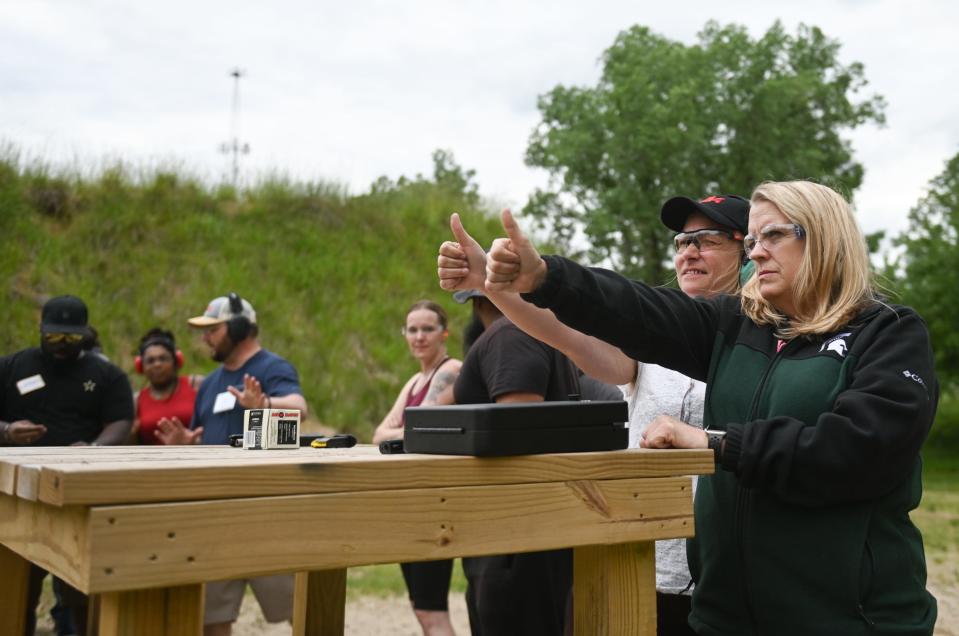

The researchers who looked at increases in first-time gun owners during the pandemic said there was now a greater need in many places for firearm training and education, specifically on gun safety.
Carlson said research has shown that about 50% of gun owners report they safely store their firearms. She added that it’s a consistently supported policy and one that has positive impacts on prevention of accidental shootings and stolen guns.
Rodgers is a proponent of safe storage and teaches it as part of his classes, adding that a trained eye can spot someone haphazardly storing a handgun in their vehicle. As an example, he said he’s seen people walk up to a Post Office and pause before walking in. They’ll head back to their vehicle for a moment and then walk back into the Post Office.
Rodgers said that’s a clear example of someone carrying a concealed handgun but only realizing at the door that they can’t walk in with it because they weren’t planning ahead. If someone isn’t planning ahead, he said it’s unlikely they’ll have the proper kind of lock box in their vehicle.
He also sees one possible path to addressing gun violence in Lansing and elsewhere: gun education for young people.
“It’s very simple,” he said. “I don’t oversimplify it because that takes away from those who have lost people or are victims.”
The prevalence of firearms in TV, movies and popular culture gives them an allure and a sense of being forbidden, he said, that naturally creates a sense of curiosity for some.
If, at that point, firearm education and training — with a focus on the dangers and proper handling — are introduced, then Rodgers said he believes young people will quickly see that picking up a gun to settle an argument isn’t their only option.
Contact reporter Matt Mencarini at 517-377-1026 or mjmencarini@lsj.com.
This article originally appeared on Lansing State Journal: Which Michigan counties have the most adults with concealed pistol licenses?

